
By VHND contributing writer Geoffrey Bell
A Different Kind of Truth is an incredible album by any measure. And whether it’s true or not, ADKOT seems like the ultimate “thank you” to the world’s most dedicated Van Halen fans. In early 2012 (Feb. 7th), Van Halen dropped the hammer on 13 songs and melted our ears off with the result. Every unique aspect of the band’s recorded history is represented in some form or another, with more bravado and excitement than any reasonable historian of the band could have expected in his or her wildest dreams!
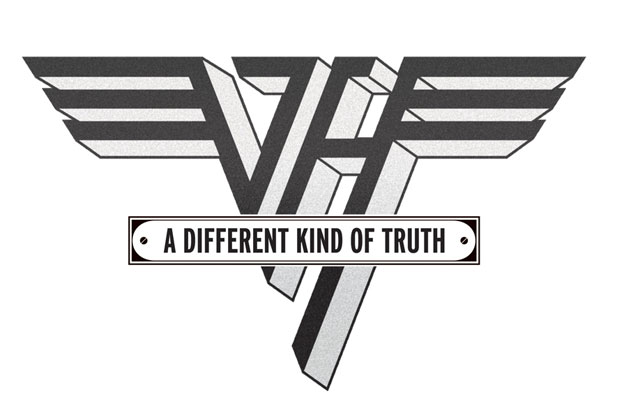
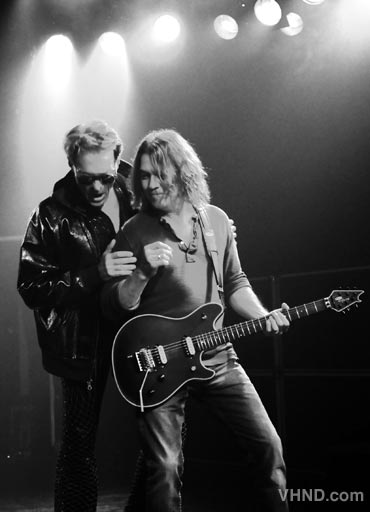 Which brings us to the seed material for roughly half the album. Before it’s release, the Van Halen News Desk reported (exclusively) that the band was working on unreleased demos from 1976 and 1977. Longtime fans responded with a unanimous cheer, because while the songs were never officially released, they had been in circulation among collectors for at least 15 years. Recently, several critics and cheap-shot artists have decided that Van Halen took the easy way out by drawing from this catalogue of unreleased music (failing to mention that nearly half the album is completely new material). We couldn’t disagree more. A great song is a great song no matter when it was first conceived. In fact, it’s well documented that rock bands regularly employ this strategy. All of the material belongs to Van Halen and was written at a time when the band was absolutely fearless. Eddie Van Halen was a riff-making machine during the late 1970’s, single handedly changing the way subsequent generations would approach the instrument. And while plenty of that music ended up on the first six albums, the band’s release schedule couldn’t keep pace with EVH’s creative output. Over time, their earliest material was overshadowed by what was happening in the moment, because Eddie was still at his creative peak. Furthermore, Eddie continued to dip into his endless surprise box of riffs and ideas on every studio album through 1995’s Balance. When the band began recording, these unreleased classics were the perfect way to connect the past and present and shake the rust off with original singer David Lee Roth. We are 100% in favor of the band milking every last drop of creativity from that era – and there’s more where that came from. It is perfection defined.
Which brings us to the seed material for roughly half the album. Before it’s release, the Van Halen News Desk reported (exclusively) that the band was working on unreleased demos from 1976 and 1977. Longtime fans responded with a unanimous cheer, because while the songs were never officially released, they had been in circulation among collectors for at least 15 years. Recently, several critics and cheap-shot artists have decided that Van Halen took the easy way out by drawing from this catalogue of unreleased music (failing to mention that nearly half the album is completely new material). We couldn’t disagree more. A great song is a great song no matter when it was first conceived. In fact, it’s well documented that rock bands regularly employ this strategy. All of the material belongs to Van Halen and was written at a time when the band was absolutely fearless. Eddie Van Halen was a riff-making machine during the late 1970’s, single handedly changing the way subsequent generations would approach the instrument. And while plenty of that music ended up on the first six albums, the band’s release schedule couldn’t keep pace with EVH’s creative output. Over time, their earliest material was overshadowed by what was happening in the moment, because Eddie was still at his creative peak. Furthermore, Eddie continued to dip into his endless surprise box of riffs and ideas on every studio album through 1995’s Balance. When the band began recording, these unreleased classics were the perfect way to connect the past and present and shake the rust off with original singer David Lee Roth. We are 100% in favor of the band milking every last drop of creativity from that era – and there’s more where that came from. It is perfection defined.
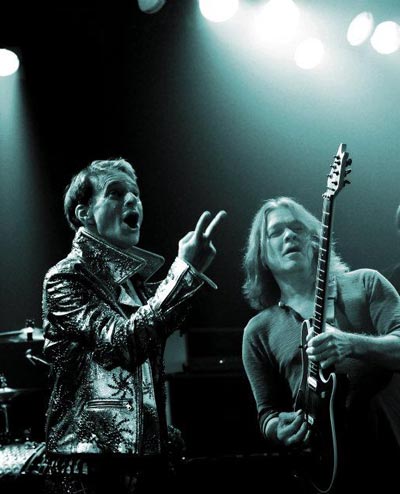 Which leads us to the album. When word leaked that award-winning producer/hitmaker John Shanks was on board, there was an instant fear that he would pour a thick layer of pop syrup on the finished product. Shanks is known for his work with a number of top-40 artists, and fans wondered if those influences would affect the new music. Instead, it appears he used gunpowder. While Shanks’ ultimate influence is unknown, A Different Kind of Truth is heavier than any VH album since Fair Warning and is arguably the most aggressive Van Halen album ever! It is also devastatingly efficient. Working from the smash and grab blueprint of their early recordings, most of the songs clock in at under four minutes. Three cuts are under three minutes, which seems like the blink of an eye when compared to songs on the band’s later albums.
Which leads us to the album. When word leaked that award-winning producer/hitmaker John Shanks was on board, there was an instant fear that he would pour a thick layer of pop syrup on the finished product. Shanks is known for his work with a number of top-40 artists, and fans wondered if those influences would affect the new music. Instead, it appears he used gunpowder. While Shanks’ ultimate influence is unknown, A Different Kind of Truth is heavier than any VH album since Fair Warning and is arguably the most aggressive Van Halen album ever! It is also devastatingly efficient. Working from the smash and grab blueprint of their early recordings, most of the songs clock in at under four minutes. Three cuts are under three minutes, which seems like the blink of an eye when compared to songs on the band’s later albums.
The album opens with “Tattoo,” the lead single and an interesting choice to kick off the set. The riff is based on an unreleased song called “Down in Flames,” known by fans from several early live recordings. A studio version of “DIF” has not been circulated, so all comparisons are relative to live performances. Reception to “Tattoo” was mixed, in large part because everyone expected the first single to be a flat-out ballbreaker. “Tattoo” is a good song with a catchy hook (absent from the original version) and is instantly recognizable as Van Halen – one of the band’s many gifts. With a volume-swelled ending that tips the hat to “Down in Flames” and “You’re No Good” from Van Halen II, “Tattoo” barely has a chance to soak in before the band thrusts the handshaker into another gear.
The synchronized guitar/bass intro of “She’s The Woman” nearly knocks you cold and is an instant reminder that Van Halen can still work the heavy bag. The tune was originally recorded on the famous 1976 Gene Simmons demos and is nastier than ever. Aside from the chorus, Dave completely reworked the lyrics. The pre-solo breakdown, famously lifted from the original for 1981’s “Mean Street,” has also changed. But the essence of “She’s The Woman” remains solid to the core and is one of the most prototypical VH songs on the album. The driving riff is a cross between “Mean Street” and “Outta Love Again” and could have easily found a comfortable home on any early DLR-era material.
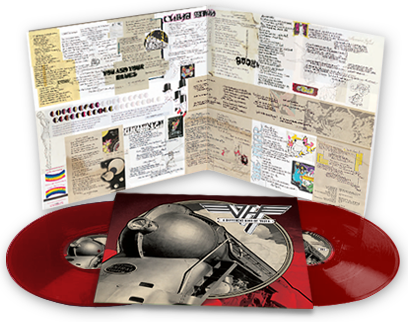
“You and Your Blues” is a new composition and would make a wise choice as a second or third single. This track hooks you early and never lets go. David Lee Roth lays himself out for this tune, delivering some of his most powerful vocals on the album. Lyrically, Dave pays tribute to some of our most famous blues songs and, probably not by coincidence, to a handful of guitarists (Hendrix, Clapton, Page, Richards) who share the top slots with EVH on any sane person’s list of greatest rock guitar players. “You and Your Blues” is also our first taste of the band’s signature background vocals, which obviously sound different without Michael Anthony, but very solid nonetheless. Complete with a soaring crescendo, this is a song that should set arenas on fire if they decide to perform it live.
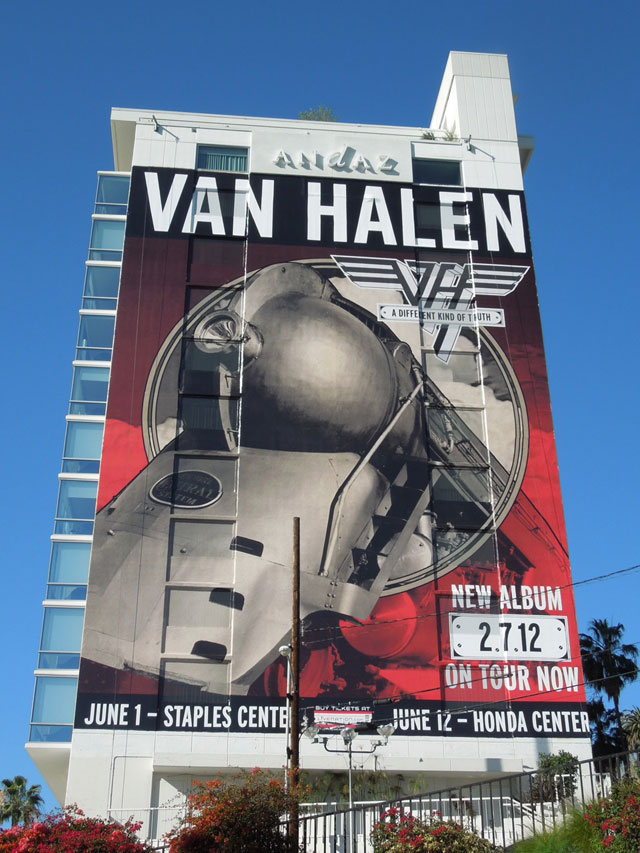
We’re stepping out of order for the next quad-pack of songs, “China Town,” “Bullethead,” “As Is” and “Honeybabysweetiedoll.” Separately or as a group, these are four of the heaviest songs Van Halen has ever laid to wax, and are absolutely blowing people’s minds! Of the four, only “Bullethead” traces its roots to the 1970s demo material and is a fairly faithful rendition of the original. Never mind that three-quarters of the band are pushing 60, it rocks just as hard. Then there’s the epic “As Is”. After Alex Van Halen’s jungle drum intro, hardcore fans instantly recognized one of the riffs as “Two Burritos and a Root Beer Float” – something Eddie performed during a September 2009 appearance on Two and a Half Men and even earlier during a 2003 NAMM demonstration. “As Is” grooves like “Hot for Teacher” on acid – a hard rock boogie for the ages busted up by a side-splitting country funk spoken word interlude that comes as a total surprise. “China Town” burns just as much gas, with gritty, streetwise lyrics that have always been an under-appreciated component of David Lee Roth’s work. “Honeybabysweetiedoll” is the most experimental track on the album, but has generated a fast following among fans who like their Van Halen served up heavy and hard. It’s a thundering mix of wild, effects-soaked guitars, sinister vocals and a rhythm section that somehow holds it all together. “Honeybaby” is a haunting song, believed by some to be a derivative of an unreleased track from the Women and Children First sessions. The similarities are fleeting and frankly, not evident to us at all, as “Honeybabysweetiedoll” stands entirely on its own. We don’t consider it to be a reworked demo, but a brand new, massive beast that has no equal.
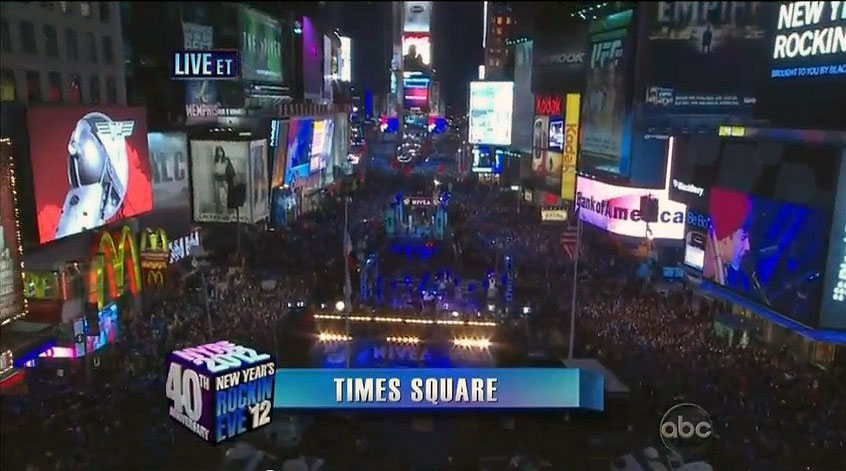
“Blood and Fire,” the album’s fifth track, washes over you like a time-machine and takes you back to the carefree days of cruising around on a summer day, windows down, blasting Diver Down or 1984 from your custom Alpine car stereo with the fluorescent green buttons. We know it as “Ripley,” a tune Eddie recorded for the The Wild Life film score in the mid 1980s. A full version of the song has been around for years, and was the only piece of music from The Wild Life sessions that featured Alex Van Halen on drums. “Ripley” was probably written around 1983 and is rumored to have been one of a handful of songs in consideration for the 1984 album. Nearly 30 years on, “Blood and Fire” was worth the wait. Featuring nostalgic lyrics and his live trademark, “Look at all the people here tonight,” Dave has the charming ability to boast without making us hate him for it. “Told you I was coming back,” he proclaims. “Tell me you missed me. Say it like you mean it!” Speaking of boasting, Eddie Van Halen tears up the solo in this song, one of his best on the entire album. There’s plenty of tender guitar steak to chew on throughout the 13 track collection, but the “Blood and Fire” solo is one of those moments where you know Eddie is just killing it. It’s a beautiful thing, because when he’s on his game, there’s not a human being on the planet that makes a guitar sound so incredible.
 While there are moments on ADKOT when Van Halen is effortlessly channeling the early 1980s, there are other moments when they sound like a completely fresh, re-tooled version of themselves. On “The Trouble With Never,” another brand new cut, Eddie plants his foot on a wah wah pedal and doesn’t let up for four solid, funk-filled minutes. Along the way, he trades licks with Wolfgang, who has clearly worked his ass off since the last tour – and it shows. We will even go as far as to say that Wolfgang Van Halen is the band’s secret weapon on this album. Eddie and Dave are always going to be the show . . . they are irreplaceable and untouchable rock legends. Alex Van Halen, content to stay in the background, never disappoints and is still one of the most powerful rock drummers alive. To our ears, ADKOT is a showcase for some of Alex’s most aggressive playing yet (see “As Is” and “China Town.”) But Wolfgang’s effort is much more than a pleasant surprise – it’s downright impressive. He doesn’t just hold down the bottom. He absolutely owns it. It doesn’t hurt that the bass is mixed loads higher than all but a couple of the band’s previous albums, which is long since water under the bridge as far as we’re concerned. Whatever the reason, WVH had a ton of latitude and takes complete advantage of the opportunity. We are convinced his musical talent will continue to impress many years after his work with Van Halen is complete.
While there are moments on ADKOT when Van Halen is effortlessly channeling the early 1980s, there are other moments when they sound like a completely fresh, re-tooled version of themselves. On “The Trouble With Never,” another brand new cut, Eddie plants his foot on a wah wah pedal and doesn’t let up for four solid, funk-filled minutes. Along the way, he trades licks with Wolfgang, who has clearly worked his ass off since the last tour – and it shows. We will even go as far as to say that Wolfgang Van Halen is the band’s secret weapon on this album. Eddie and Dave are always going to be the show . . . they are irreplaceable and untouchable rock legends. Alex Van Halen, content to stay in the background, never disappoints and is still one of the most powerful rock drummers alive. To our ears, ADKOT is a showcase for some of Alex’s most aggressive playing yet (see “As Is” and “China Town.”) But Wolfgang’s effort is much more than a pleasant surprise – it’s downright impressive. He doesn’t just hold down the bottom. He absolutely owns it. It doesn’t hurt that the bass is mixed loads higher than all but a couple of the band’s previous albums, which is long since water under the bridge as far as we’re concerned. Whatever the reason, WVH had a ton of latitude and takes complete advantage of the opportunity. We are convinced his musical talent will continue to impress many years after his work with Van Halen is complete.
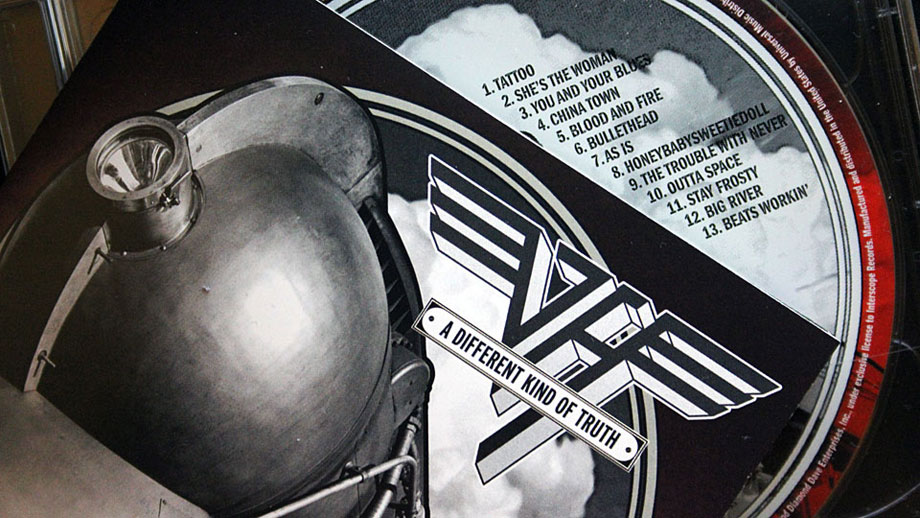
The final four tracks on ADKOT are just amazing, and are comprised of three classic gems and one new tune, “Stay Frosty,” an “Ice Cream Man” boogie that BEGS to be played live. Again drawing inspiration from their 1977 Warner Brothers demos, the band grinds out new versions of “Let’s Get Rockin'” (“Outta Space”), “Big Trouble” (“Big River”), and “Put Out The Lights” (“Beats Workin'”). Musically, “Outta Space” is probably the most faithful recreation of its unreleased counterpart, with a delivery that is equal parts “Atomic Punk” and “Light Up The Sky.” A Different Kind of Truth ends with “Beats Workin’,” which is considerably changed from the demo days. The riff still sounds like it came straight out of the 1970s, but an improved chorus and wild post-solo breakdown (somehow melding “Day Tripper” and “All Right Now”) are the icing on the cake.
There are several additional takeaways from A Different Kind of Truth. First, it’s great to have Eddie Van Halen throwing the fastball again. His guitar work on this album is a firm roundhouse to the jaw of every gasbag who took joy in saying his chops were fried. In our book, it takes a lot more than a few tough years to knock the king off his throne. Second, it’s beyond magical to have David Lee Roth recording with Van Halen again. Dave’s voice, words and overall flavor have always been the perfect complement to Eddie’s music. Dave’s a sharp, funny guy who deserves as much credit as anyone for making this project happen. For the most part, Dave did the talking in the weeks leading up to the album’s release. From his interviews with Ed and Al, to his storytelling at the Cafe’ Wha?, Dave seems sentimental as he time goes by – almost taking on the role of band historian. Perhaps that’s why it makes so much sense that his role has come full circle. Which brings us to a final thought about the CD booklet. Detailed liner notes and lyric sheets have become a lost art in the digital age. On occasion, interested fans might download a .pdf of an album’s lyrics for a quick glance before letting it rot forever in a random download folder. The liner notes for A Different Kind of Truth are a throwback to the great album booklets of our youth. Lyrics for all thirteen songs were entirely handwritten by David Lee Roth, with accompanying sketches, doodling and artwork. Dave put a lot of work into the final product and it’s a keeper, creating an additional connection to the music that is often overlooked.
28 years after the last full album with David Lee Roth, A Different Kind of Truth is exactly the album Van Halen fans wanted. Selfishly, we don’t want Van Halen to evolve, we want them to pick up where they left off. Miraculously, that’s almost exactly what they did. At the beginning of this article, we speculated that Van Halen recorded this album with their most dedicated fans in mind. Whatever the motivation, we owe Ed, Al, Dave and Wolf a huge thank you and an even bigger round of applause for a mind-blowing, masterpiece of an album.
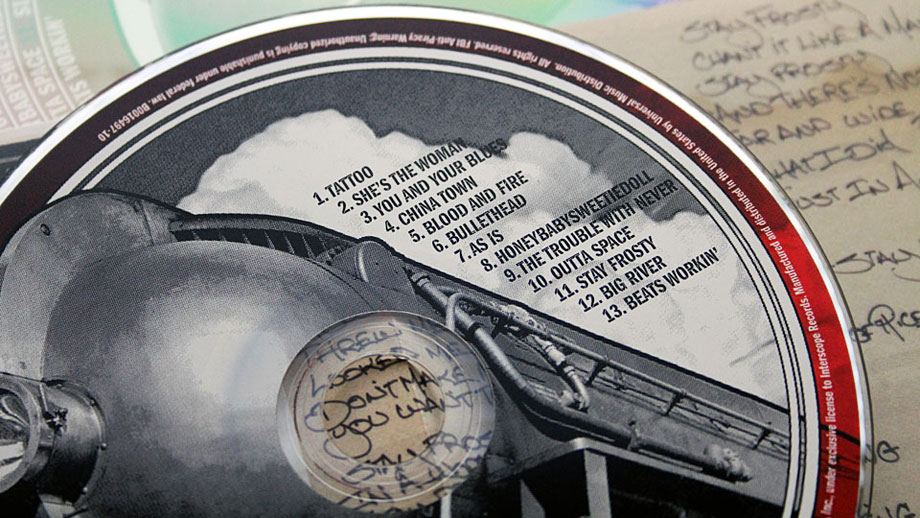
Related Articles:
Van Halen’s A Different Kind of Truth the “Number One Album of 2012″ According to Ultimate Classic Rock
Van Halen’s A Different Kind of Truth wins Best Comeback Album on THAT METAL SHOW
Van Halen’s A Different Kind of Truth: #1 Rock Album on Billboard
Rolling Stone picked “Stay Frosty” as one of the best songs of the year
Van Halen’s “Outta Space” Named Best Song of 2012 by Ultimate Classic Rock!
Guitar World’s staff proclaims A Different Kind Of Truth the #1 album of the year
Van Halen Wins “Comeback of the Year”, “Best Rock Guitarist”, and “Most Valuable Player” in Guitar World’s 2012 Reader’s Poll
Van Halen: A Different Kind Of Truth – The VHND Review
The New Album: Your Reviews (Over 1,300 reviews)
Video Review: Midnight Phil Reviews A Different Kind of Truth
Van Halen’s A Different Kind of Truth Nominated for ‘Best Rock Album’ in Guitar World’s 2012 Readers Poll
Wolfgang Van Halen Describes the Birth of A Different Kind of Truth
Van Halen’s A Different Kind Of Truth Sixth Best Selling Rock or Pop Album Of 2012
Eddie Van Halen On A Different Kind Of Truth: “We Recorded Demos For 35 Songs”
Ross Hogarth Discusses Mixing Van Halen’s ‘A Different Kind Of Truth’
‘A Different Kind of Truth’ Sets Van Halen Fans Free

Shop All Men’s / Unisex Official Van Halen Shirts at Van Halen Store